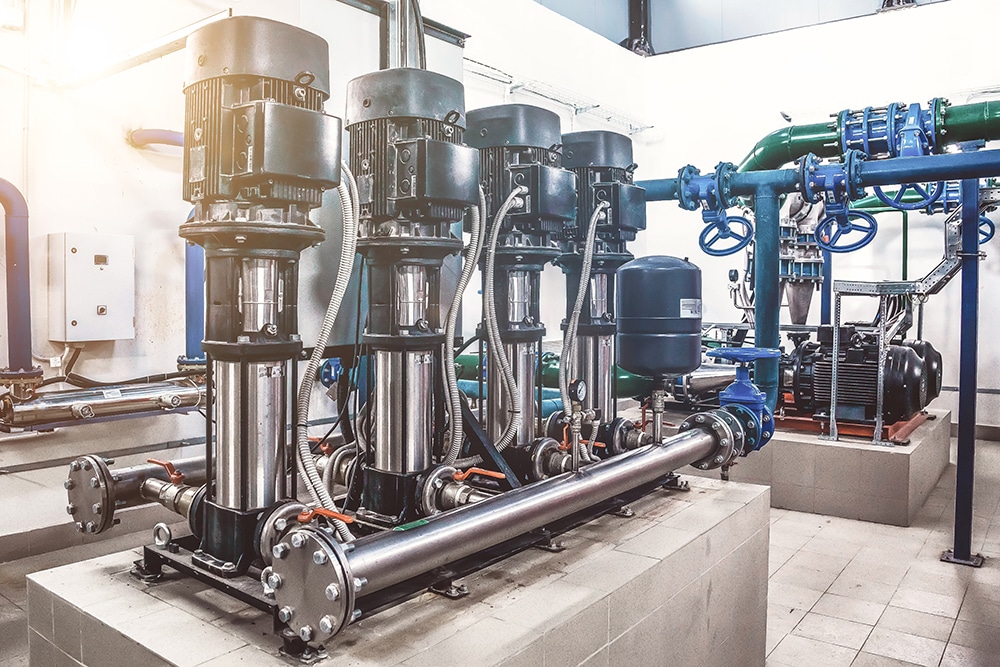Industrial use of water refers to the production water used in the industrial production process and the domestic water used by the employees in the plant. After agriculture, it is the second largest user of water in the world.
The main uses of water in industry
Modern industrial water system is huge, and there are many water links. Not only do factories and enterprises need a lot of water, but they also have certain requirements for water supply sources, water pressure, water quality, water temperature, etc.

- Water for production
The water used directly for industrial production is called production water. Production water includes cooling water, process water and boiler water. - Indirect cooling water
In the industrial production process, in order to ensure that the production equipment can work at normal temperature, used to absorb or transfer the excess heat of the production equipment, the cooling water used (this cooling water and the cooled medium is separated from the heat exchanger wall or equipment), known as indirect cooling water. - Process water
In industrial production, used to manufacture and process products and the manufacturing and processing process related to this part of the water, known as process water. Including product water, washing water, direct cooling water and other process water. - Boiler water
Boiler water and boiler water treatment water are collectively called boiler water for process or heating, power generation and steam production. Including boiler water, boiler water treatment water. - Water for living
The water used by workers in the factory and workshops for living and other purposes is collectively referred to as domestic water.
Among them, cooling water generally accounts for 60% to 70% of industrial water use. Although the industrial water consumption is large, the actual consumption is not much, and the general water consumption is about 0.5% to 10% of the total water consumption, that is, more than 90% of the water can still be reused after proper treatment.
Industrial use of water example
There are many industrial categories and a wide range of products, and their production processes vary. Such as the production of alcohol and food industries, the use of water as a raw material for production. Power generation, metallurgy and other sectors use water as a coolant to keep the temperature of rolling machines or products under control. All industrial processes use water to rinse equipment, raw materials or products to ensure their quality.
The process of using water in industry is much more complex than in agriculture. This is not only because there are many different types of industrial water and different water quality requirements for them, but also because many industries also discharge wastewater while using water, which contains many impurities and can cause water environment pollution when discharged arbitrarily, but can be reused after proper treatment.
Sources of industrial water
- Surface water
Surface water includes the runoff formed on the land surface and the water stored on the surface (such as rivers, streams, lakes, reservoirs, etc.). - Groundwater
Groundwater includes underground runoff or buried in the ground, after the extraction of fresh water can be used (such as diving, pressurized water, karst water, fissure water, etc.). - Tap water
Tap water is the water supplied by the city water supply network system. - Seawater
Some industrial use in coastal cities as a source of cooling water or the part of seawater taken for other purposes. - Municipal wastewater reuse water
After treatment to meet the water quality standards of industrial water and back to the industrial production of that part of the city sewage, known as urban sewage reuse. - Other water
Some enterprises use water other than the above-mentioned water as a source of water intake according to their specific conditions, known as other water.
Industrial water saving pathways
- Strengthen enterprise water management
Through the use of seawater, atmospheric cooling source, artificial cooling, multi-use of one water, etc., in order to reduce the loss of water or cooling water and improve the efficiency of water consumption. Through strengthening enterprise water management, establishing special water management institutions and water management system, implementing water conservation responsibility system, assessing and implementing to production teams, and making necessary rewards and punishments to achieve the purpose of eliminating waste and saving water. - Save water through process reform
Implement clean production strategies, change production processes or adopt water-saving or even water-free production processes, and reasonably carry out industrial or production layouts to reduce the demand for water in industrial production. The fundamental measure is to save water and reduce emissions or pollution through the reform of production processes. - Improve the reuse rate of industrial water
The main way to improve the reuse rate of industrial water is to change the way of water production (e.g. change the use of straight water to recycled water) and improve the recycling rate and reuse rate of water. Improving the reuse rate of water can usually be carried out under the basic conditions of the production process, which is relatively easy to achieve, so it is the main way to save water in industry.
Summary
In general, industrial water is used exclusively for industrial production, with high water consumption and frequency. Therefore, the management of industrial water and the treatment of industrial wastewater are issues that require attention and solutions. Different industries produce a variety of wastewater with different levels of pollution, which is treated through factory-owned wastewater facilities, industrial park wastewater treatment plants, municipal wastewater treatment plants, etc.
KUOSI provides integrated industry solutions and water treatment equipment for water and wastewater treatment. Such as wastewater screens, roots blowers, dosing systems, DAF system, filter presses, screw presses, paddle dryers, sodium hypochlorite generators, etc.
KUOSI is one of the equipment brands of “GL Environment”, and “GL Environment” also supplies Apure brand water quality monitoring instruments and HAOSH brand dosing metering pumps. Please feel free to contact us for solutions and quotations, our professional “GL Environment” sales engineers are looking forward to serving you.
